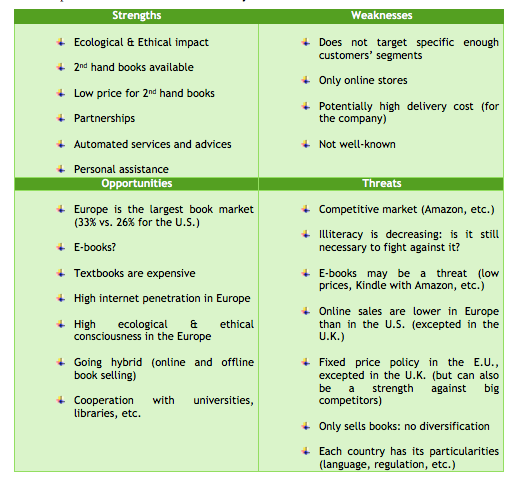

SWOT Analysis
A SWOT analysis consists in identifying the Strengths, Weaknesses, Opportunities and Threats of a company or an organisation. It aims at providing information to help the company to accomplish its objectives and to tackle any obstacles that may arise.
Our decision to do a SWOT analysis is based upon the necessity to have a clear overview of the strengths and weaknesses of the company and to spot the opportunities and threats that it will face in the European market. Besides, this SWOT analysis will be brief and concise in order to provide a short conclusion of our analysis.
The majority of European booksellers do not have a view upon ecological and ethical impacts of their products on the environment and the society. That is something BWB Europe could work on to differentiate from other booksellers.
Furthermore, used-books are widely available in the European book market with low price, by definition, (which is by the way the largest market in the world) as presented in the section regarding book suppliers. Furthermore, BWB partnerships are vast advantages for the Business because they are important providers of books and probably of human assets. The firm also has ‘automated services and advises’ that are basically algorithms developed by tech savvies to offer precise and specific proposals to customers based on their tastes and their favourites books and genres. Additionally, BWB offers a Personal assistance service, which consists in an after-sales service and books’ reviews done by the staff.
On the other hand, BWB can sell second-hand textbooks (much cheaper than the new ones) and thus attract more customers who might be price sensitive. A relevant opportunity to take into account is the rise of the dot-com in the European book market. Thereby, an e-BWB-store can be a big advantage and a low-risk investment for the US Company. Besides, Europe has a high Internet penetration thereby; the e-based Company should not worry about interactions within its selling platform between book buyers, book donators and other stakeholders. Nevertheless, offline stores still are the dominant players in the European book industry and thereafter this market should not be downright overlooked.
Moreover, as stated before, Europeans tend to have a high ecological awareness. Another fascinating element is the cooperation between BWB and its book providers. As it has been pointed out in the suppliers’ section, universities and libraries are important players in BWB supply chain since the former have on the one hand a big network of both buyers of books and donators, and they have on the other hand tons of books waiting to be dispatched.
Even though BWB has a high potential and much strength, one shall not ignore the risks and the drawbacks in such an undertaking. First of all, BWB is not a hyped Company in Europe. Actually it is a new concept barely seen in the Old Continent. Therefore, a marketing campaign shall be made in order to cope with such a state. Secondly, it only has online stores so that might be a problem since it does not have a ‘physical’ interaction with its customers. That is why a Personal assistance service is being implemented. Moreover, the company’s initial strategy seems too broad: it is not aiming or focusing on a precise market segment.

As explained before, the book industry in Europe is, as a matter of fact, a very competitive market with a big hindrance to BWB: Amazon. If we look closely within this market, Kindle is a threat to BWB because it offers its users e-books at a vey low price comparing to the market standard and benchmark. However online sales are not that high and do not account for a relevant market share in continental Europe. On the other hand, BWB has product diversification concerns and jeopardies since the former sells only books. When looking into its rival’s portfolio, Amazon offers for example e-readers (and other non-reading products).
Also, BWB’s main motto is to fight against illiteracy. The problem is that the latter is shrinking in the developing countries therefore: ‘Is it still necessary to fight against it?’
